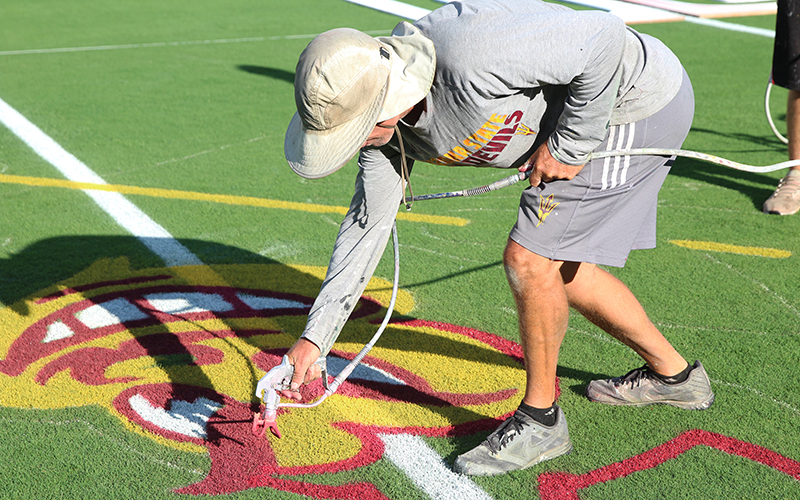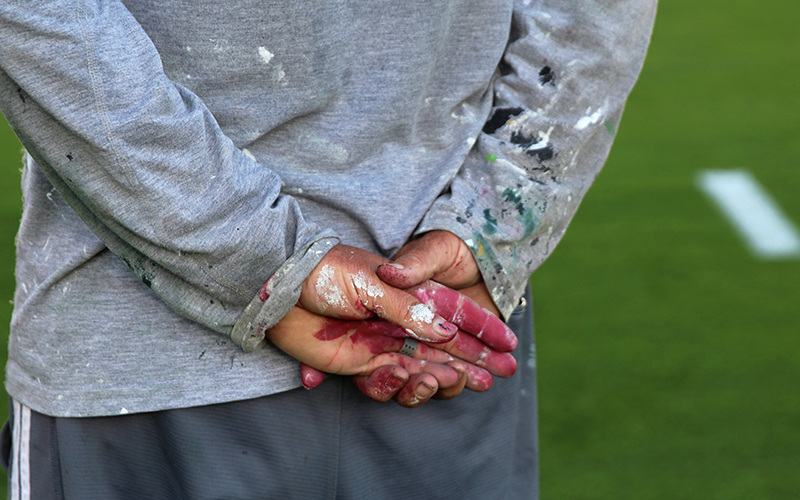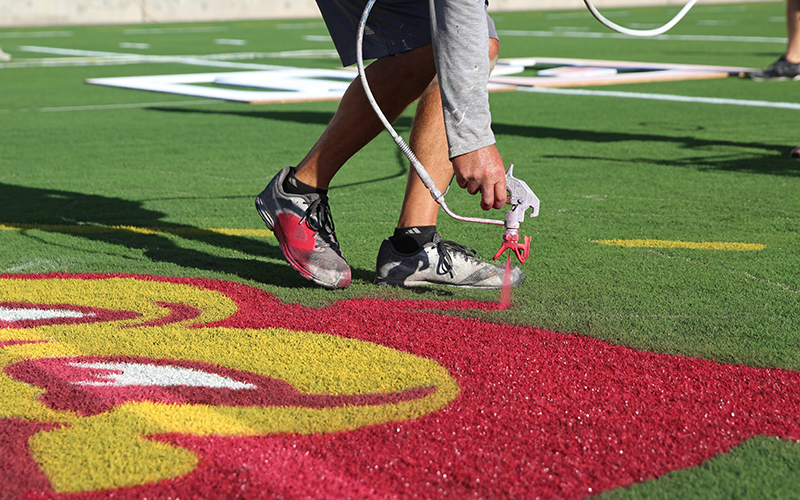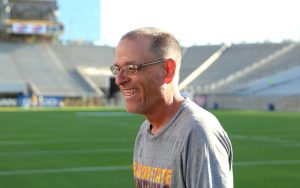
Brian Johnson, Arizona State’s athletic grounds facilities manager, adds Sparky to the football field before ASU’s season opener against Texas at San Antonio. (Photo by Kylee Meter/Cronkite News)

The hands of ASU groundskeeper Brian Johnson often look this way during his workday at Sun Devil Stadium. (Photo by Kylee Meter/Cronkite News)

By the time Brian Johnson is finished painting the field, the logo on his shoes are no longer be visible. (Photo by Kylee Meter/Cronkite News)
TEMPE – It’s 7 a.m. and Sun Devil Stadium is blanketed by shade, its stands deserted. Brian Johnson, who arrived two hours earlier, paces around the football field, marinating in sweat and camouflaged in maroon and gold paint.
They are the same colors that have been tattooed on Johnson for 33 years, since he joined Arizona State in 1985. He serves as Arizona State’s athletic grounds facilities manager, with responsibilities that include maintaining the field every day of the week during college football season. For Johnson, this is the busiest time of the year.
On Friday, Johnson and his crew were preparing for the Sun Devils’ 2018 football season opener against the University of Texas at San Antonio on Saturday. They have worked for weeks to build the stage for the four-hour turf war set to take place.
“When I’m watching TV, I never watch a game for what’s going on in the game. It’s always checking out the field,” Johnson said.
His crew’s weekly routine consists of mowing the grass seven days a week, fertilizing and watering the field on weekends, outlining logos and painting them in before game days, and seeding the field after games.

After 33 years, Brian Johnson still enjoys maintaining ASU’s fields. (Photo by Kylee Meter/Cronkite News)
Without Johnson, and groundskeepers as a whole, football teams wouldn’t have a field suitable for play. The daily routine of field work and preparation is, quite literally, the groundwork for the sport, much like the athletes who receive treatment and training to get their bodies ready for game day.
When Sun Devil Stadium hosted Super Bowl XXX in 1996, the groundskeeping crew needed extra bodies to paint the field, so Johnson showed up to help. He’s held the job ever since, painting the logos for every Super Bowl since then, save for one.
“Right place at the right time,” Johnson said.
On game days, while the rest of the world is watching a football game, Johnson stares down at the field impatiently, feeling each metallic-spiked step that sears itself into his life’s work, longing for the game clock to strike zero so that he may return to his field.
“I like when they run the ball up the middle,” Johnson said, “because that keeps the clock moving so there’s fewer plays, so the field isn’t beat up as much.”
Johnson inspects what work he and his team will have to undertake once the stadium is vacated, a consequence of working as a groundskeeper for more than three decades.
Johnson has been coming back to ASU every year, rarely turning down the task offered to him. Working on fields is what he does. Other than wanting to spend more time with his family, and dreaming of climbing the Himalayas, it’s all he wants to do for now.
“Once I walk away, I’m just going to walk away.”
Until then, though, Johnson will walk toward the field, nurturing it and preparing it for the next time the Sun Devils run through the stadium tunnel.